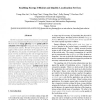Free Online Productivity Tools
i2Speak
i2Symbol
i2OCR
iTex2Img
iWeb2Print
iWeb2Shot
i2Type
iPdf2Split
iPdf2Merge
i2Bopomofo
i2Arabic
i2Style
i2Image
i2PDF
iLatex2Rtf
Sci2ools
PERCOM
2006
ACM
2006
ACM
Enabling Energy-Efficient and Quality Localization Services
Recent localization research has focused on improving the accuracy of pinpointing the physical location of a target. We think that the energy efficiency and the quality of the localization services (QoLS) are equally important properties of localization systems. We refer to the QoLS as the timely supply of the location information to the applications. Energy efficiency and quality are seemingly two contradictive goals in terms of determining the rate of triggering the localization systems to perform the necessary computation and communication. In that, a lower location sampling rate contributes to a lower level of energy consumption but in the meantime compromises the timeliness of acquiring the location information. Opting for energy efficient and quality localization services, we propose a mobility-aware mechanism that adapts the sampling rate to the target mobility. Results from our simulations and live experiments confirm that the adaptive sampling approach is promising and effect...
Localization Error | Location Sampling Rate | PERCOM 2006 | Quality Localization Services | Wireless Networks |
Related Content
| Added | 24 Dec 2009 |
| Updated | 24 Dec 2009 |
| Type | Conference |
| Year | 2006 |
| Where | PERCOM |
| Authors | Tsung-Han Lin, Polly Huang, Hao-Hua Chu, Hsing-Hau Chen, Ju-Peng Chen |
Comments (0)

